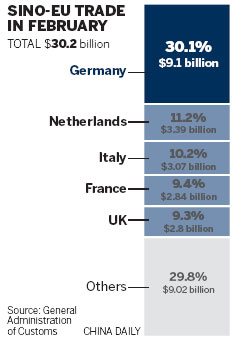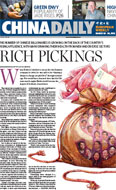Trade winds still blowing strong
Updated: 2011-03-18 11:51
By Zhong Nan (China Daily European Weekly)
In February, China registered a trade deficit of $7.3 billion with the rest of the world, the biggest monthly deficit in seven years. Imports rose 19.4 percent year-on-year to $104 billion, while exports grew only 2.4 percent year-on-year to $96.7 billion.
Some economists believe the slowdown in exports growth could help China readjust its industrial structure and dampen the clamor for an early appreciation of the yuan.
He Jingtong, a professor at the Institute of Economics of Nankai University in Tianjin, says that the export slowdown may last for one or two months. At the same time China will continue to buy a wide range of goods from the EU and the United States, including high-tech equipment, airplanes and agricultural products.
He feels that the slowdown in exports will provide enough room for the government to resist the demand for yuan appreciation.
The yuan has gained nearly 3.5 percent against the US dollar after China tweaked its foreign exchange policy in June 2010. But some countries, including the US, have been calling for a further appreciation of the yuan.
US Treasury Secretary Timothy Geithner reiterated on March 3 that the yuan is substantially undervalued and putting other countries at a competitive disadvantage.
Meanwhile exporters are set to feel the pinch as the trade focus veers more and more to imports.

"Rising labor and raw material costs coupled with currency concerns are major issues for us," says Ding Mingquan, president of Fujian Jinjiang Aojin Knitting & Garments Co Ltd.
"These combined factors have eroded nearly 4 percent of our gross profit," he says. Ding runs a swimsuit factory, in Jinjiang, Fujian province, and exports nearly 95 percent of his production to European countries and the US.
Wang Tao, head of China Economic Research with UBS Securities, says China's exports will bounce back in a few months before slowing down with decreasing demand for made-in-China goods.
"China's trade surplus will shrink this year, and in some months deficits will be recorded as commodity prices, including iron ore, grain and crude oil, may increase," Song says.
During the first two months of this year, imports of iron ore jumped by 22.6 percent to 120 million tons, while soybean shipments grew by 6.1 percent to 7.45 million tons, year-on-year. But their prices, on average per ton, surged by 62.6 percent for iron ore and 22.7 percent for soybean during this period.
"As commodity prices rise, it is likely that we will see more deficits," says Zhang Xiaoji, senior researcher with the Development Research Center of the State Council.
China's trade surplus decreased 34 percent to $196.1 billion in 2009, and last year, the surplus further fell by 6.4 percent, to $183.1 billion.
Li Daokui, a central bank adviser, says that the surplus will fall to $150 billion in 2011 and the ratio of surplus to GDP will drop to less than 1 percent in one to two years, from 3.1 percent in 2010.
E-paper

City of Joy
Welcome to the 'world of smiles' where life meanders slowly.
Debate on nuclear power revived
The future is now
Common approach
Specials

Earthquake Hits Japan
A massive 8.8 magnitude quake hit the northeast coast of Japan on March 11,2011.

NPC & CPPCC sessions
Lawmakers and political advisers gather in Beijing to discuss major issues.

Slide: Japan quake
Devastating earthquake and tsunami left millions without water, electricity, homes or heat.
